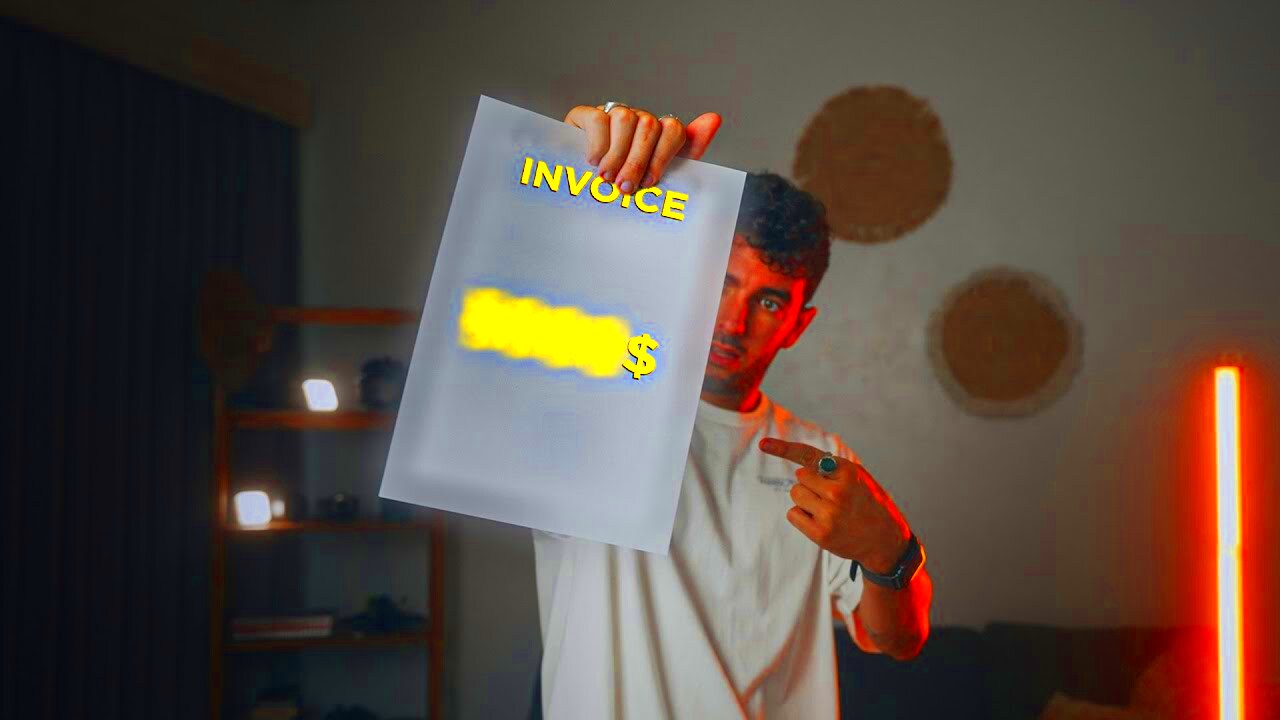Freelance videography is a thrilling career path that enables creative experts to be independent workers. Offering unique services depending on their skills and experience, freelance videographers could be shooting weddings, promotional videos or documentaries. Freelancers, unlike full-time jobs have the liberty to set their own prices, control their time as well as select projects they want to undertake. Nevertheless, the flexibility comes along with challenges; pricing including is one of them. Therefore understanding what affects the fees charged by freelance videographers is important in ensuring that both parties are treated equally when it comes to charges.
What Influences the Charges of Freelance Videographers?

How freelance videographers set their prices is affected by several factors. These factors often determine how much a videographer can realistically charge and what the value of services provided are:
- Experience: More experienced videographers typically charge higher rates due to their refined skills and portfolio.
- Equipment: High-quality cameras, drones, lighting, and sound equipment add value to the service, and those with better gear may charge more.
- Project complexity: A basic event recording differs greatly from a commercial production. The more complex the project, the higher the price.
- Editing time: Post-production work, including editing, sound design, and effects, takes time and effort, contributing to overall costs.
- Location: Rates vary significantly depending on the location, with urban areas generally having higher prices than rural regions.
- Client requirements: Custom requests such as special effects, motion graphics, or specific filming techniques will likely increase the cost.
Discussing openly about the pricing is important so that videographers and clients can eventually arrive at a situation where payment is justifiable and hence the need of understanding these aspects.
Also Read This: How to Send a Buyer Request on Fiverr as a Seller
Average Rates for Freelance Videographers

There are several factors that can play into freelance videography rates, but there are some general benchmarks that can help you to understand average pricing:
| Experience Level | Hourly Rate | Project Rate |
|---|---|---|
| Beginner | $25 - $50 | $300 - $500 |
| Intermediate | $50 - $100 | $500 - $1500 |
| Expert | $100+ | $1500 and above |
The table demonstrates that the most skilled videographers tend to have the best tools and command premium pricing. On the other hand, lesser-known professionals may prefer using reduced tariffs for client acquisition while their advanced counterparts do not hesitate to fix their charges at skyrocketing amounts.
In addition, project-specific fees vary with project type. For instance, basic event filming can cost hundreds of dollars but advertising and promotional videos may range upto thousands. Therefore, videographers need to evaluate every job on its own merit so as not to be underpaid.
Also Read This: How to Cancel a Fiverr Gig: A Step-by-Step Guide
How Location Affects Freelance Videographer Earnings
Your training data goes up until October 2023.
- Market Demand: Cities with thriving media industries, such as Los Angeles or New York, generally offer more opportunities and higher pay.
- Cost of Living: In high-cost areas, freelancers may need to charge more to cover their living expenses.
- Competition: Areas with many videographers can lead to price wars, while less populated regions may allow for higher rates.
- Clientele: Different regions attract different types of clients. Corporate clients often pay more than individual clients.
- Travel Costs: If a project requires traveling outside the local area, freelancers may charge extra to cover travel expenses.
Therefore, through location based pricing, videographers are able to access their target niche and make proper pricing decisions in the marketplace.
Also Read This: How to Cancel an Order in Fiverr
Types of Projects and Their Impact on Earnings
The earnings of freelance videographers depends largely on the kind of project they take. Each project has its own requirements, complications and time commitment associated with it which results to different remuneration levels. Below are some projects in common and the estimated earnings they can bring:
| Project Type | Description | Average Earnings |
|---|---|---|
| Weddings | Capturing the big day, including ceremonies and receptions. | $1,000 - $5,000 |
| Corporate Videos | Promotional content, training videos, or company events. | $1,500 - $10,000 |
| Documentaries | In-depth storytelling projects that require extensive filming and editing. | $5,000 - $20,000 |
| Real Estate | Showcasing properties through video tours. | $300 - $1,500 |
| Social Media Content | Short clips or ads for platforms like Instagram or TikTok. | $500 - $3,000 |
The table indicates that there is a wide variation in earnings according to the type of project. Wedding videography can be very lucrative because of its demand, while corporate projects usually have larger budgets. Videographers can increase their chances of making more money if they select appropriate projects and grasp their worth.
Also Read This: How to Freelance for Fiverr
Additional Costs Freelance Videographers Should Consider
Freelance videographers need to take into consideration a few other expenses that may affect their total earnings while setting rates. Knowing these expenses is necessary to run a viable business. The following are some of the important costs:
- Equipment Costs: Cameras, lenses, microphones, and lighting can be expensive. Regular upgrades and maintenance are necessary.
- Software Subscriptions: Video editing software, sound design programs, and cloud storage often come with monthly or annual fees.
- Insurance: Liability and equipment insurance protect against potential losses or accidents during shoots.
- Marketing Expenses: Investing in a website, business cards, and promotional materials helps attract new clients.
- Travel Expenses: Gas, lodging, and meals can add up, especially for destination projects.
- Taxes: Freelancers must set aside a portion of their earnings for taxes, which can be a significant expense.
To remain viable in their freelancing professions therefore, videographers must factor all of these costs whilst fixing prices for their services. Furthermore, assessing regularly expenses and making price adjustments whenever necessary is vital for staying healthy financially.
Also Read This: How Truckers Can Make Money on Fiverr
Ways to Increase Earnings as a Freelance Videographer
When you are a freelancer in the profession of videography, there are several effective means that can be put into effect so that additional earnings can be accrued. This doesn’t only include raising prices; it involves gaining more experience, making robust connections with other professionals, and promoting oneself well. These are some useful strategies of increasing one’s income:
- Diversify Your Services: Offer a range of services such as event coverage, corporate videos, and promotional content to attract different clients.
- Enhance Your Skills: Invest time in learning new techniques, software, or equipment. This can allow you to take on more complex projects.
- Build a Strong Portfolio: Showcase your best work online. A well-curated portfolio can attract high-paying clients.
- Utilize Social Media: Use platforms like Instagram, TikTok, and YouTube to showcase your work and connect with potential clients.
- Network Effectively: Attend industry events, workshops, and networking meetups. Building relationships can lead to referrals and new opportunities.
- Offer Packages: Create bundled services at a discounted rate to encourage clients to purchase more. For example, combine shooting and editing services.
As a result of systematically adapting strategies for impactful freelance videography, you can fortify your market presence thereby appealing more potential business and maximizing on your profit margins.
Also Read This: How to Pass the Fiverr SEO Skill Test
How to Set Your Prices as a Freelance Videographer
Setting rates as a freelance video creator may seem like a perplexing task, but it is important that you don’t mess it up so that you get fair pay for the job done. Here are some important points to remember while setting up prices:
- Research the Market: Look at what other videographers in your area are charging. This can give you a baseline for setting your own prices.
- Consider Your Experience: Factor in your level of expertise and the quality of your work. More experienced videographers can command higher rates.
- Calculate Your Costs: Consider all your expenses, including equipment, software, insurance, and taxes. Make sure your rates cover these costs.
- Determine Your Value: Reflect on what unique skills or services you bring to the table. Highlighting these can justify higher prices.
- Decide on a Pricing Structure: Choose between hourly rates or project-based pricing. Each has its advantages, depending on the type of work you do.
Eventually, to establish your rates you must find equilibrium between what you need to make and what customers are ready to pay. Adjust your prices with changing skill sets and market demands.
Also Read This: How to use Fiverr to grow your social media presence
Frequently Asked Questions
Here are several frequently asked questions that would-be freelance videographers often ask, along with their responses:
- What should I charge as a beginner? It’s common for beginners to start at a lower rate, typically between $25 to $50 per hour, as they build their portfolio.
- How do I handle negotiations with clients? Be open to discussions, but also be firm about your worth. Present your rates clearly and justify them with your skills and experience.
- Is it worth investing in high-end equipment? Yes, but only if you have a clear plan on how it will enhance your work and attract clients willing to pay more.
- What if I don’t have a lot of experience? Focus on building a solid portfolio, even if it includes personal projects or volunteer work. This can help you gain credibility.
- Should I create contracts for my projects? Absolutely. Having a contract protects both you and the client by outlining the scope of work, payment terms, and deadlines.
By confronting these usual worries, it will be easier for you to find your way through the maze that is freelancing and ultimately achieve greatness in this line of work.
Conclusion
To sum up, freelancing videography is a fulfilling profession that allows for creativity and monetary gains. For practical rate setting, one needs to know how different factors, for example, area, job kind or extra expenses impact on earnings. Therefore, what may seem like hard mean towards establishing a successful career in freelancing include increasing your visibility and customer base while at the same time reviewing your price structure. Continuous learning and changing according to trend shows good prospects in this fast-paced area. If you are able to combine zeal with committment to other approaches which are essential in making videography lucrative, then success is yours altogether.




